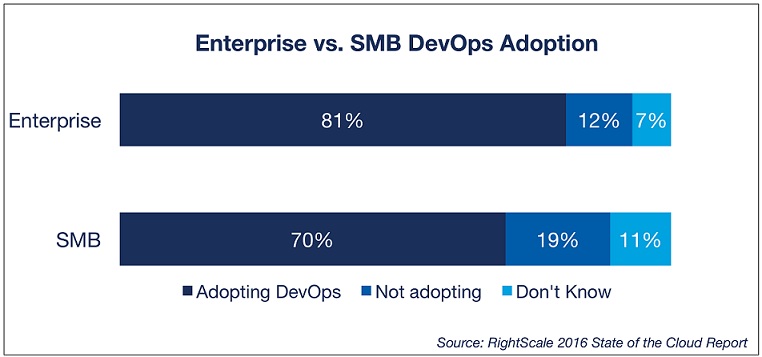Check Point® Software Technologies Ltd.(link is external) announced that U.S. News & World Report has named the company among its 2025-2026 list of Best Companies to Work For(link is external).
It’s no secret that DevOps is taking the enterprise by storm. In a recent RightScale survey, more than 80 percent of the enterprise and 70 percent of SMBs are adopting DevOps.

At its core, DevOps is about building and delivering quality software at scale. But exactly how you go about doing that is going to vary from company to person to project. DevOps does not look the same anywhere.
As our VP of Worldwide Transformation Justin Arbuckle describes in Data Economy(link is external), an effective approach to changing your development processes and teams should start with ALDO – Agile Lean DevOps Outcomes. As he notes, begin with “a practical discussion about what you’re trying to achieve. Then you consider what combination of approaches will help deliver the results you need.” Let’s take a closer look at ALDO:
■ Agile makes and delivers projects in smaller chunks. And the ability to change what you’re building, based on customer feedback, while you’re building it.
■ Lean removes barriers that add friction to your development process. Or those that add friction to your attempts to create value for the customer.
■ DevOps ensures everybody across your organization who is a stakeholder in the outcome of a particular application, is also stakeholder in its creation.
■ Outcome: Now what task in the world isn’t better tackled by breaking it down into smaller pieces? Or adapting if the task changes? Or using more efficient processes? Or collaborating more?
And while these concepts may seem daunting, you don’t need to boil the ocean to get started. As our CEO Barry Crist told Caroline Donnelly of Computerweekly(link is external): "The best way to drive change is, instead of having a very conceptual conversation about things, to get people from across the whole IT stack and get them working on one thing. The result will become readily apparent."
So if you’re looking to start driving change inside your organization, it just takes one project and the courage to test out a new approach.
Lucas Welch is Director of Communications at Chef
Industry News
Postman announced new capabilities that make it dramatically easier to design, test, deploy, and monitor AI agents and the APIs they rely on.
Opsera announced the expansion of its partnership with Databricks.
Postman announced Agent Mode, an AI-native assistant that delivers real productivity gains across the entire API lifecycle.
Progress Software announced the Q2 2025 release of Progress® Telerik® and Progress® Kendo UI®, the .NET and JavaScript UI libraries for modern application development.
Voltage Park announced the launch of its managed Kubernetes service.
Cobalt announced a set of powerful product enhancements within the Cobalt Offensive Security Platform aimed at helping customers scale security testing with greater clarity, automation, and control.
LambdaTest announced its partnership with Assembla, a cloud-based platform for version control and project management.
Salt Security unveiled Salt Illuminate, a platform that redefines how organizations adopt API security.
Workday announced a new unified, AI developer toolset to bring the power of Workday Illuminate directly into the hands of customer and partner developers, enabling them to easily customize and connect AI apps and agents on the Workday platform.
Pegasystems introduced Pega Agentic Process Fabric™, a service that orchestrates all AI agents and systems across an open agentic network for more reliable and accurate automation.
Fivetran announced that its Connector SDK now supports custom connectors for any data source.
Copado announced that Copado Robotic Testing is available in AWS Marketplace, a digital catalog with thousands of software listings from independent software vendors that make it easy to find, test, buy, and deploy software that runs on Amazon Web Services (AWS).
Check Point® Software Technologies Ltd.(link is external) announced major advancements to its family of Quantum Force Security Gateways(link is external).
Sauce Labs announced the general availability of iOS 18 testing on its Virtual Device Cloud (VDC).












